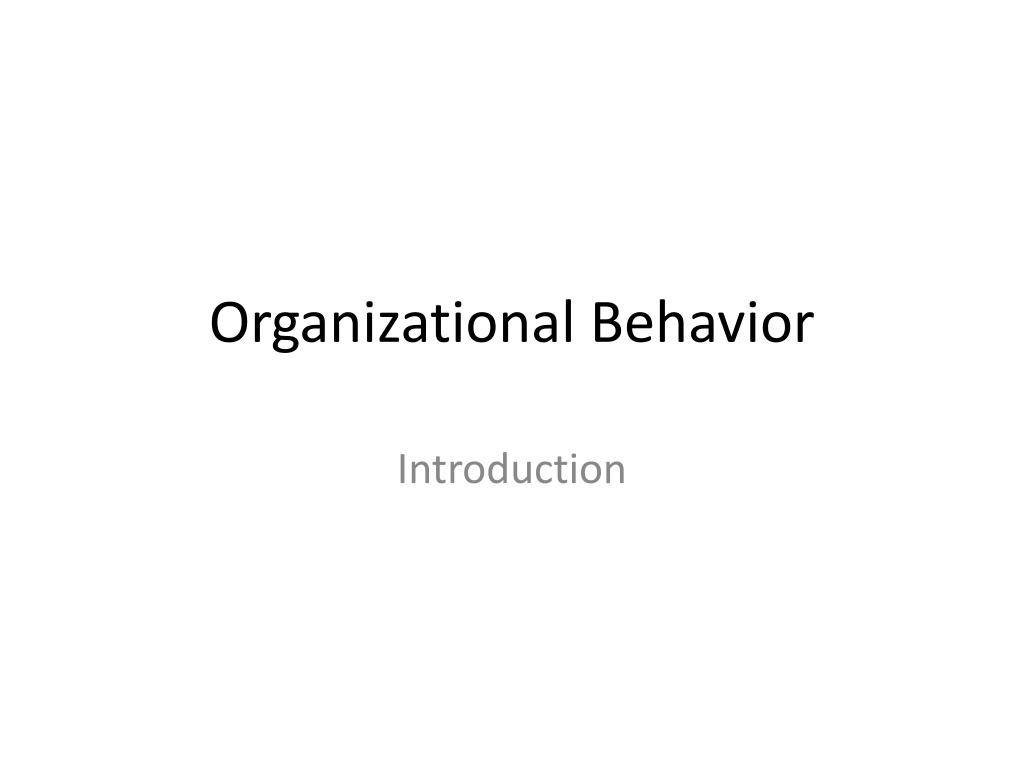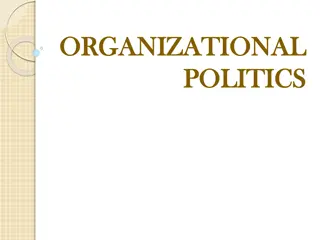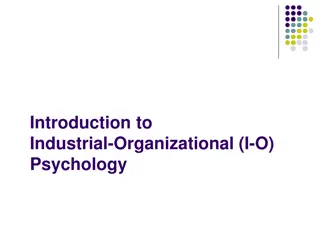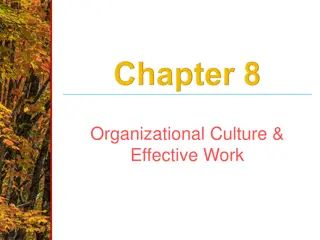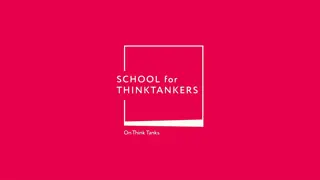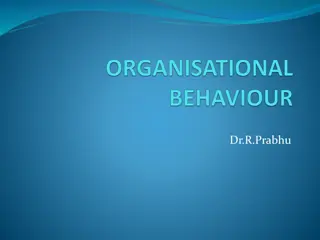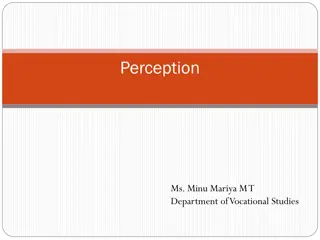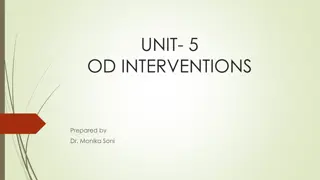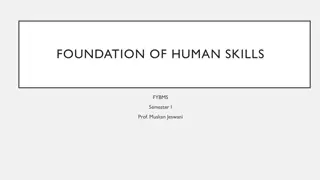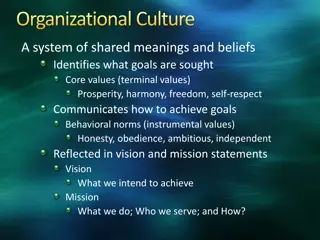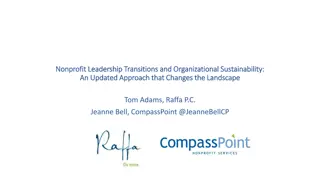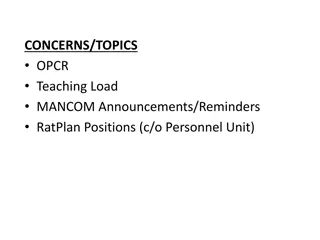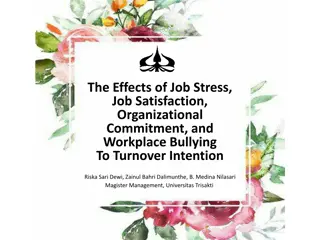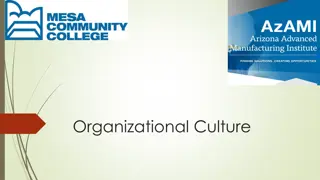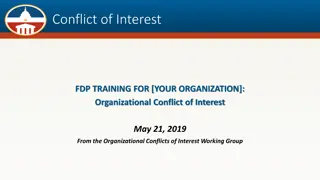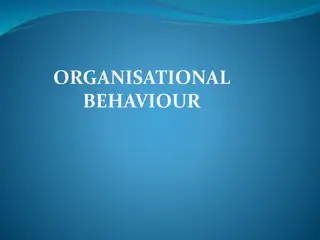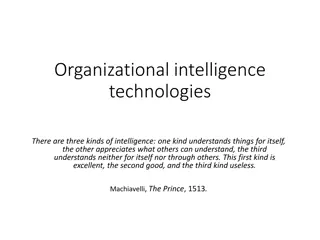Understanding Organizational Behavior and Individual Behavior
Organizational Behavior (OB) is a multidisciplinary field that combines knowledge from various disciplines to study and manage organizations effectively. It emphasizes the application of this knowledge to enhance organizational effectiveness and the well-being of participants. OB is a useful concept as it addresses problems at both psychological and sociological levels, highlighting the importance of behavior in organizational settings. Individual behavior is examined in terms of man's basic nature, interactions with the environment, and motivators. The questions posed lead to considerations on designing societies to influence change in individuals and applying these principles to work organization design.
Download Presentation

Please find below an Image/Link to download the presentation.
The content on the website is provided AS IS for your information and personal use only. It may not be sold, licensed, or shared on other websites without obtaining consent from the author. Download presentation by click this link. If you encounter any issues during the download, it is possible that the publisher has removed the file from their server.
E N D
Presentation Transcript
Organizational Behavior Introduction
OB is a field of study First knowledge from wide variety of disciplines is necessary for the effective study and management of organizations Second, Knowledge from these disciplines can be and should be applied to problems of the management of people Third, the application of knowledge can result in simultaneous increase in organizational effectiveness and the psychological health and growth of Organizational Participants
IS OB a USEFUL CONCEPT? Behavior is behavior whether it occurs in organizations or not and Organizational often influences people to look for non existent differences or discontinuities between behavior in general and behavior which occurs in organizations
OB term is useful in three ways It suggests that Problems in Modern organizations must be approached at both the Psychological and Sociological Level Even though behavior is behavior whether it occurs inside or outside the organizations some determinants are more important in organizational settings than in other situations A third advantage of term although potentially a disadvantage too. OB is more likely to be offered by business and professional schools than by departments of Psychology and Sociology. In comparison with Foundation disciplines the emphasis of the area is more Clinical and Practical than Theoretical. However this Practical tendency does not mean that Theory is not Important in Organizational Behavior
Individual Behavior 1.What is man basically like?(what is his basic nature and how malleable is he) 2.How do people interact with their social and physical environment? (how do they view their environment and learn about it) 3.What causes men to act or behave? (what motivates man)
Questions Finally in view of your answers to the first THREE questions, 2.How could you design a society or a social system which could change the man in any directions which you would like to change? 3.What Problems would you face in developing such system? 4.How would you apply these principles to the design of the work organizations ?
ANSWERS 1. Social Animal, By Nature Good- But then, Imitative behavior, Greedy and Selfish, Physically Tangible but Socially and Mentally Intangible. Unpredicted Nature, Individual Differences makes him Unique. Acts according to society, thinking about society before act, stucked in mind, malleability is god gift, flexible, adjust in any situation, kind and good but its their mask. Understanding Nature, reactionary (react in different situations) a Learner, adorable, Sensitive, animal , Difficult to Understand, complicated, Temporary feelings he had, Man is like Unopened Box nobody knows what's in it. By nature man is like a water
2.Environment affects- Before act he thinks about Society First, Concern about Social Image, Don t want anybody to interfere in his life but get involves in others issue or Problem, socialization is heart of personality building, Forming Trust and Mistrust, Identity Crisis, Recognition, Social and Physical Environment having Great Impact, His nature is depends on his Environment, Very posessive Social animal hence interaction is purposeful
3.Thinking Habit, challenges, motivation, attitude, Perception, feelings, emotions, Behavior is reflection of Society Situation or Unpredictable behavior of people, expectations, Insult Situations, Experiences, Culture, Environment etc affects Actions of others Matters
Individuals Behavior Thought Process Core Self Vision Behavior Feelings
Individual Behavior All decisions and actions by a person are influenced by implicit and or explicit assumptions about the nature of reality. This is especially important in Social Interaction; My assumptions influence my behavior toward others and hence affect their behavior toward me Faulty assumptions of Human nature are dangerous because they may generate undesired consequences and because they are often self fulfilling they may lead to problems which can not be easily diagnosed or corrected
Meaning and Definition OB is a study of Human Behavior The Study is about behavior in Organizations and Knowledge about human behavior would be useful in improving an organizations effectiveness.
OB is the study of organizational components and their impact on human behavior and organizational performances. Such study can benefit from various behavioral and social sciences. OB means the study of the behavior of individuals and groups in organizations, and organizations themselves, as they act and interact to attain desired outcomes.
Definitions OB is the study of and application of Knowledge about how people act within the organizations. It is a human tool for human benefit. It applies broadly to the behavior of people in all types of Organizations such as business, Government, schools and service organizations. OB is directly concerned with the understanding, prediction and control of human behavior in organizations.
Environment Human Behavior in Organizational Settings The Individuals Behavior The Organization Environment
OB is the study of Human behavior in organizations; the interface between human behavior and the organization and the Organization itself. The behavior of employees and the organization is subject to the influence of Environment (Refer Figure )
The Filed of Ob is exciting and complex. Many variables and concepts accompany the interactions shown in the figure and together these factors greatly complicate the managers ability to Understand, appreciate and manage people in organization. They also provides unique opportunities to enhance personal and organizational effectiveness.
Fundamental Concepts of OB OB is basically based on few Fundamental concepts which revolve around the nature of people and organizations. 1. Individual differences- People have much in common, but each person in the world is also individually different. Each individual is different from others in several ways e.g. Intelligence, Physique, personality, diction etc. Individual differences mean that management can get the greatest motivation among employees by treating them differently. Because of Individual Differences OB begins with individual. Only a person can take responsibility and make Decisions; a group by nature can not do so. A group is powerless until individuals act therein
2. A whole Person- when an individual is appointed, his/her skill alone is not hired, his/her social background- likes and dislikes, pride and prejudices is also hired. A persons family life can not be separated from factory life. It is for this reason that managers shall Endeavour to make factory, a home away from home. They do not only strive hard to develop a better employee out of a worker, but also a better person in terms of growth and fulfillment.
3. Caused Behavior Behavior of an employee is caused and not random. The behavior directed towards some end that the employee believes, rightly or wrongly, is in her best interest. Thus when a worker comes late to his work, abuses the supervisor, there is a cause behind. Manager should realize the cause for late coming. Cause and Effect relationship.
4.Human Dignity This concept different than other three concepts. It is more an ethical philosophy than the scientific conclusion. It confirms that people are to be treated differently from other factors of production because they are of a higher order in the universe. It recognizes Human Dignity because people are of higher order, they want to be treated with respect and dignity and should be treated in this way. Employees work should be appreciated and recognized The concept of Human Dignity rejects the old idea of using employees as economic tools. Since OB always involves people, ethical philosophy is involved in one way or another in each action. Human decisions can not and should not be made apart from values.
5.Organizations are Social System Organizations are social system, consequently activities therein are governed by social laws as well as psychological laws. Just as People having Psychological Needs, they also have social needs, they also have social roles and status. Their behavior influenced by their group as well as their drives. Two social systems existing in Organization, one is Formal and another one is Informal social system All parts of the system are interdependent and are subject to influence by any other part. Everything is related to everything else.
6.Mutuality of interest Organizations Need People and Vice versa. Organizations have human purpose, they have formed some mutuality of interest among their participants. People see organizations as means to help them reach organizational objectives. Result of Mutuality is, people are encouraged to attack Organizational Problems rather than each other.
7. Holistic approach When the Six Fundamental Concepts of OB are placed together a holistic concept emerges. This concept interprets people-organization relationship in terms of the Whole Person, Whole Group, Whole Organization and Whole Social System.
Key Elements of OB Influenced Behavior People OB Environment Structure Technology
Nature of OB A separate field of Study not Discipline An Interdisciplinary approach (Psychology, Sociology, Anthropology) An applied Science A Normative Science A Humanistic and optimistic approach Cause and Effect Relationship Science as well as Art Rational Thinking (Logical Thinking)
INPUTS + PROCESS= OUTPUT Rationality Experience Opinions Data Facts Sound Conclusion Rational Thinking Logical Conclusion People
Scope of OB OB is the study of human behavior in organizations. The subject encompasses, 1. The Study of Individual Behavior 2. Inter-individual Behavior 3. Behavior Organizations themselves.
Intrapersonal Behavior covers such aspects as personality, attitude, perception, learning, opinion, motivation and job satisfaction. Interpersonal Behavior includes group dynamics, intergroup conflict, leadership, communication, transactional analysis Organizations the study covers such aspects as their formation, structures, and formal and informal organizations.
Significance of OB Helps in Understanding Employees Helps in Motivating Employees Improving Superior - Subordinate Relationship Controlling and predicting human behavior Helps in Proper Utilization of Human Resource Helps in achieving Individual, Group and Organizational goal as well as efficiency and effectiveness Helps to know employees strengths and weaknesses
Historical and Emerging Perspectives of OB Concern for the welfare of workers in management of Business enterprises has been in existence since ages. Systematic management of Human Resources as early as the 4thBC (Kautilya s Arthashastra) The government then took an active interest in the operation of Public and Private sector enterprises and provided systematic procedures for regulating employee-employer relationships.
Elsewhere HR in organizations received managements attention much earlier; as early as 1800 B.C. itself minimum wage rate and incentive wage plan was included in the Babylonian code of Hammurabi.
Robert Owen 1800 Robert Owen a young Welsh factory owner about 1800, was one of the first to emphasize the Human needs of employees. He refused to employ young children Taught employees cleanliness and temperance and improved their working conditions Vital Machines as to inanimate Machines Father of Personnel Management This could hardly called modern organizational behavior, but the beginning in that direction was made.
Andrew Ure 1835 Andrew Ure published The Philosophy of Manufacturers in which he included Human Factor as one of the factors of Production, besides the commercial and mechanical parts. Believing in the importance of the Human Factor, Ure provided workers with hot Tea, medical treatment and sickness payments.
J.N.Tata He took special interest in the welfare of his workers. He installed first humidifier and fire sprinklers in his factories. He was decade ahead of his time and miles ahead of his competitors. The Empress mills experiments showed that not only profits but people mattered for him. Innovations at Empress Mill weren t restricted to technology adoption. In fact, lack of skilled and semi-skilled labor was perhaps a bigger challenge. Workers would be absent for sixty days a year due to festivals and for several days during harvest times. Absenteeism was 10 to 20 percent a day. Jamsetji & team set about to make workers life easier. A Provident Fund Scheme was introduced in 1886 and pension fund was introduced in 1887. Accident compensation scheme was introduced in 1895. Most of these came before Factory Act of England making certain measures compulsory. Empress held an annual prize day were workers turned up in colorful holiday attire for performance recognition. As many as 1000 workers were called to the platform to collect prizes of gold and silver watches and chains, armlets, medals and bundles of cloth.
In Jamsetjis words at the opening of the extension of Empress Mills in 1895, We do not claim to be more unselfish, more generous, or more philanthropic than other people. But, we think, we started on sound and straightforward business principles, considering the interests of our shareholders our own, and the health and welfare of our employees the sure foundation of our prosperity .
Scientific Management Taylor the Father of Scientific Management as he converted broad generalizations into practical tools. He was also responsible for awakening interest in workers in the 1900s. Taylor advocated the selection of Right Person for Right Jobs. Training them adequately, placing them in jobs for which they were best suited and remunerating them handsomely. Taylor s Goal was technical efficiency, but at least management was awakened to the importance of HR which was hitherto neglected.
Taylor Published his major work Principles of Scientific Management in 1911. Taylors ideas were criticized particularly his belief in rationalizing everything and holding the assumption that human behavior is based on Rabble Hypothesis
